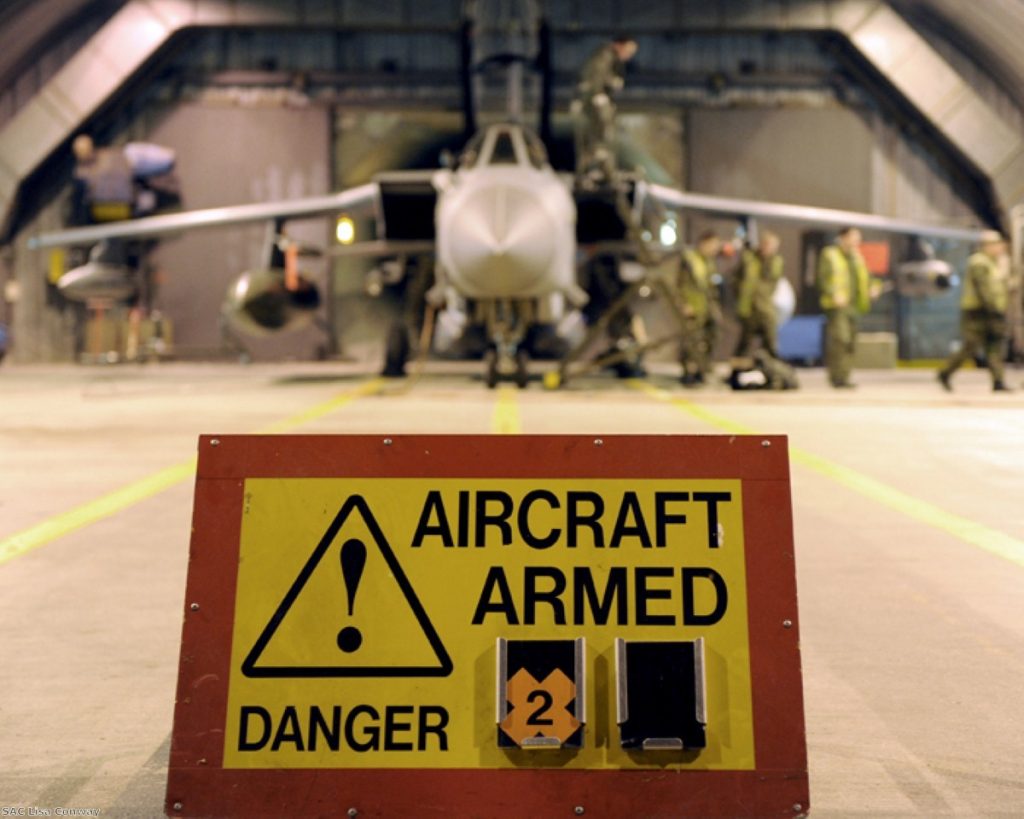Analysis: Libyan question-marks are multiplying fast
It’s only day three, but already the political and military risks attendant on Britain’s latest military intervention are becoming clearer and clearer.
It’s no surprise there are communications issues – the implementation of the no-fly zone has been a rushed job, after all. “I’m having a few chief of defence staff issues,” one No 10 spin doctor was heard to mutter this morning. He was referring to the mix-up over whether or not it is the British government’s stated policy that Muammar Gaddafi simply cease prosecuting his war against Libyan rebels, abandon his position of power or, in extremis, be wiped off the face of the earth.
General Sir David Richards had made clear the Libyan leader is not a military target, ruling out the latter. But the prime minister’s official spokesman was far from unequivocal this morning. Politically, he made clear, the government obviously wants the Libyan leader to abandon power. But militarily? “It’s very clear our aim is to implement the UN security council resolution.” Working out what that text permits and what it does not is a matter of interpretation.


This is, relatively speaking, only a minor headache. The real consequences of the haste with which the international community has intervened in Libya are much more troubling.
They are manifesting themselves, for now, as a multiplying swarm of question-marks. Top of the list of concerns is the position of the Arab states, whose enthusiasm for an intervention last week was relied on heavily by David Cameron in the Commons on Friday.
How unfortunate, then, that he will not be able to do so today with quite the same degree of certainty: shortly after the first missiles began to land Amr Moussa, the League’s secretary-general, began voicing his concerns. He has subsequently reiterated his support for a no-fly zone, calming the nerves of Cameron who spoke to him over the weekend. They are now “on the same page”. But that early wobble should be taken as a warning sign that initial Arab support could easily fade.
One misguided missile would be enough to fundamentally alter this delicate balance. Senior military figures in the Ministry of Defence were doing all they could this lunchtime to emphasise quite how much the risk of civilian casualties is playing on their minds.
Last night a Tornado flying from Britain (the first time this sort of mission has taken place from British soil since 1945) got very close to Libya before the decision was taken to abort an airstrike, because of the number of civilians nearby. “This decision underlines the UK’s commitment to the protection of civilians,” Major-General John Lorimer said. Intelligence, from whatever source, saved the MoD’s bacon on this occasion. Any kind of technical fault – and it’s happened many times before in Afghanistan – could mean a real disaster for the fledgling international coalition seeking to enforce the UN’s will. The targeting process is “incredibly detailed”, officials have insisted. The Tornados will be relying on the Lighting 3 targeting pod, which “allows scrupulous adherence to the rules of engagement”. So far, despite what the Gaddafi regime has claimed, the MoD insists it has not caused any civilian casualties at all. The moment that changes, the international situation will, too.
Let’s assume that the military does its job, implementing the no-fly zone faultlessly. Let’s assume, also, that the transition from the current ad hoc structures – with the US taking overall command – to a Nato-organised system runs smoothly. If all goes according to plan, attention will then focus back to the situation on the ground in Libya. Gaddafi has been robbed of his strategic dominance of the skies over his country. But he is far from defeated on the ground.
That ominous word ‘stalemate’ is becoming something of a cliché among military analysts, but it sums up the situation. Gaddafi may be down, but he is not out. Thanks to international intervention the same applies to those who oppose him. The systematic targeting of his command-and-control facilities, deemed legitimate as part of the no-fly zone enforcement, will undermine his capacity to take on the rebels. This will help, but is unlikely to prove decisive. Not unless, by some convenient accident, he happens to be visiting a command structure when a missile hits it.
Until that game-changing event occurs the world faces huge uncertainty about what’s going to happen next in Libya. When in doubt, speculative questions about what might lie ahead tend to prompt a default response from both political and military representatives. We’re implementing the UN security council resolution, they reply. Yet its legal and, more importantly, diplomatic foundations rest on the context of what has gone before – the prospect of Gaddafi’s retribution on Benghazi.
What happens if Tripoli comes under attack from unscrupulous rebel forces? Or if Gaddafi rallies his troops to make further military progress, advancing once again on Benghazi? Then the international community will have to decide what it meant when it pledged to take “all necessary measures” to protect civilians.
In Westminster, the shouts of around 200 protesters making their opposition to the Libyan intervention known to those in government are drifting up to politics.co.uk’s office in parliament. They are a nascent presence now, a shadow of the enormous Stop the War demonstration which preceded the Iraq invasion. If things go wrong, their number could increase. It can’t be ruled out, for we just don’t know what’s ahead. The spectre of doubt is not going to go away in a hurry.

